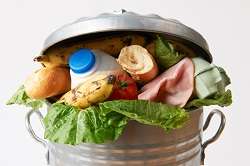New guidelines and tools to combat food waste

An EU-funded project has used its final project meeting in Brussels to showcase its final results and inform policymakers on how significantly reducing food waste can lead to a more resource-efficient Europe.
The FUSIONS project, due to finish in July 2016, was initiated with the aim to significantly reduce food waste in Europe throughout the entire supply chain. Food waste has been singled out as a major policy issue to address, particularly due to the EU's ambitious environmental targets and commitment to the development of a truly circular economy. The FUSIONS project team has estimated that current food waste levels for the EU28 amount to approximately 88 million tonnes per year, which is the equivalent of 20 % of all food produced in the EU. This is to a cost of EUR 143 million and 304 million tonnes of CO2 emissions, 6 % of the EU28's annual greenhouse gas emissions.
Policy analysis and social innovation pilots
One of the first tasks that the project set itself was to conduct a detailed policy analysis of existing EU legislation and policies that had implications on food waste. They identified 53 acts that impacted on food waste in a variety of policy areas, including agriculture, fisheries, enterprise and industry, taxation, trade, health and consumers, and the environment. The project partners are also still in the process of finalising a similar detailed analysis on relevant national legislation in the EU28, covering both Member States within and outside the FUSIONS consortium.
Armed with such detailed knowledge of EU and national-level policies and legislation, the project has developed a set of recommendations on which mark-based instruments could be best utilised to support food waste initiatives and stimulate social innovation initiatives. They identified two distinct clusters, one emphasising subsidies and grants/tax credits, and the second emphasising informational tools addressing food waste reduction and prevention – this includes general public awareness campaigns, voluntary agreements and marketing standards.
FUSIONS has pioneered seven social innovation projects in six Member States with the capacity to inspire similar projects across the EU28. The projects were supported by FUSIONS consortium members in collaboration with local organisations. One project focused on schools, by providing a set of guidelines for teachers and households on how to lower food waste, as well as to better inform both parents and children on the importance of food waste prevention. Another project compiled detailed recommendations on encouraging the development of 'social supermarkets', organisations which sell food, at least a part of which is sourced from surplus food, to poorer people at a reduced price. Social supermarkets are seen as bridging the gap between traditional food retailing and donation.
Food Waste Quantification Manual
Another key tool developed by the FUSIONS team is a detailed Food Waste Quantification Manual, aimed specifically towards relevant national authorities in the EU Member States. The manual provides practical guidelines for a standard approach on how to quantify food waste in different stages of the food supply chain. These guidelines cover three main activities: quantifying food waste in each sector (i.e. 'stage') of the food chain; combining sectoral quantifications using a common framework at national level; and reporting the results of the national food waste quantification study at country level in a consistent and comparable manner. Member States are not obliged to use the manual, but if a Member State claims to have used the manual's approach for quantifying and reporting food waste at national level, then it needs to follow certain core requirements to ensure uniformity and consistency.
National representatives from Belgium (Flanders) and the UK presented to the project's final conference on their experience in using the manual. They highlighted the manual's common language and its good balance between harmonisation and flexibility, allowing national authorities to utilise the data and strategies that they have already developed, rather than having to build entirely new methodologies and processes from scratch. However, it was suggested that the integration and interaction of the manual with EUROSTAT food waste monitoring could be further explored for the future.
Next steps
Overall, the FUSIONS team hopes that the project will make a significant contribution to the EU taking the global lead on the quest to reduce food waste. The large collaborative network developed throughout the project's lifespan is also likely to remain active and contribute to future projects and programmes.
More immediately, the project has submitted all of its findings and tools to the European Commission to be further developed, particularly as part of the delivery of the Commission's 'Roadmap towards a Resource Efficient Europe' and its target of achieving a 50 % reduction in food waste by 2020.
More information: For more information please see www.eu-fusions.org/
Provided by CORDIS


















